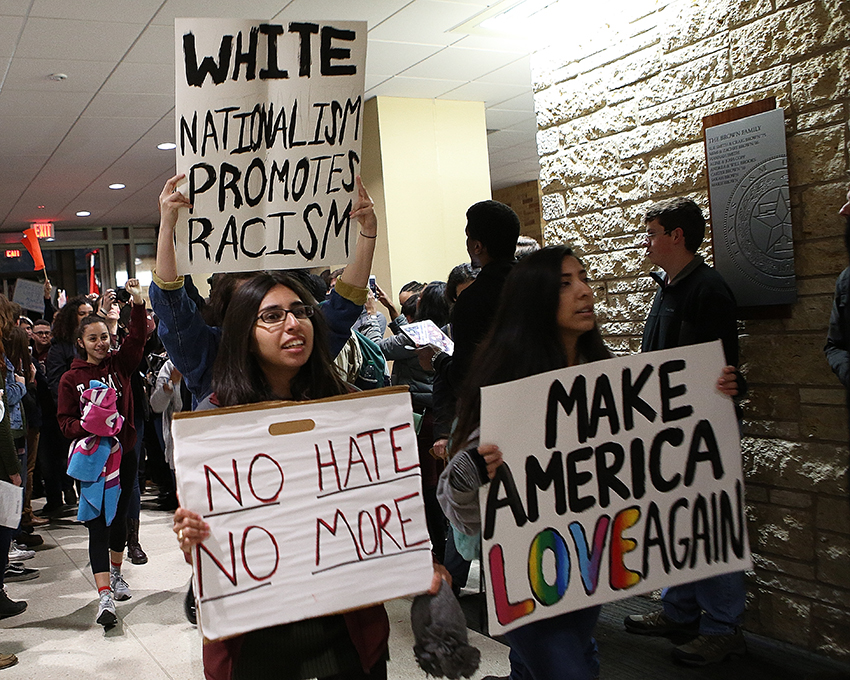Earlier this month Texas A&M canceled a “White Lives Matter” rally scheduled to occur on its campus in September, furthering conversations about free speech on college campuses.
The organizer of the rally, Preston Wiginton, is not affiliated with A&M, but he has hosted events on its campus in the past. Last December, Wiginton brought white nationalist Richard Spencer to A&M. The controversial visit sparked protests and led to a change in A&M’s policy, which no longer allows outside individuals to use campus facilities.
“His views and those of the group he represents are counter to the core values of Texas A&M,” A&M spokesperson Amy Smith told The Battalion, the university’s student newspaper. “While he has the right of free speech, so too do we have the right to refute those views and get on with the daily business of a world-class university.”
This change in policy more closely aligns with UT’s policy on invited speakers. UT Spokesperson J.B. Bird said only the University itself, the faculty, staff and student groups can use UT facilities for events.
“Within the University community, the campus is a place for the vigorous exchange of diverse viewpoints, but our campus at UT Austin is not open to outside groups to hold rallies or protests,” Bird said.
Bird said each situation is unique, so he could not speculate on what would happen if such an event was planned at UT. The campus will continue to be a space reserved for business, research and the educational purposes of UT, Bird said.
“The safety of students is always a top priority for the University,” Bird said. “The University also vigorously protects freedom of inquiry and expression. Problems arise if people engage in threatening or violent actions, which the University prohibits.”
Last year the Young Conservatives of Texas hosted Ben Shapiro at UT who talked about the censorship of free speech and the “fascist left.” While no students protested Shapiro at UT, police did escort Shapiro out of an event at California State University in Los Angeles last February because of safety concerns brought about by student protests.
This week, more violence over free speech broke out at University of California at Berkeley, where members of the left-wing group antifa attacked conservative protestors, according to The Washington Post. The protests were sparked by UC Berkeley’s plan to host Shapiro and right-wing figure Milo Yiannopoulos this fall.
“You have the right at Berkeley to expect the university to keep you physically safe,” UC Berkeley Chancellor Carol Christ wrote in an open letter on August 23. “But we would be providing students with a less valuable education, preparing them less well for the world after graduation, if we tried to shelter them from ideas that many find wrong, even dangerous.”
Geoscience sophomore Spencer Czerniak thinks A&M should have allowed Richard Spencer to speak. Czerniak attended Shapiro’s speech last year and said while there were people who disagreed in the audience, they were able to ask questions and have a conversation with the speaker.
“They talked to him, they had questions, they asked for his opinion on certain things, and I think that’s really good for all kind of speeches,” Czerniak said. “It’s nice that people from ideologies that don’t necessarily correlate with the speakers, they’ll go and they’ll still try to understand the point of view of that speaker.”
Jessie Yin, a government and international relations freshman, said A&M made the right call shutting down the “White Lives Matter” rally. Even though hate speech isn’t defined by the Supreme Court, Yin said, it still should not be allowed.
“A big part of the problem when it comes to shutting down controversial things like white supremacist marches and demonstrations is people always bring up freedom of speech and limiting that,” Yin said. “A big part of the issue is that there’s never been a case where the Supreme Court has defined hate speech and on what grounds it’s okay to shut something down on the basis of hate speech.”















